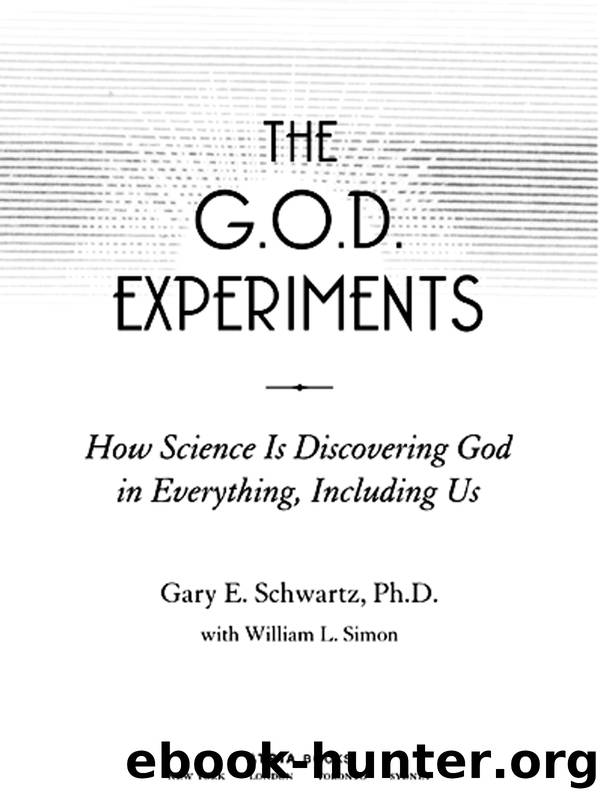The G.O.D. Experiments by Gary E. Schwartz & William L. Simon

Author:Gary E. Schwartz & William L. Simon [Schwartz, Gary E. & Simon, William L.]
Language: eng
Format: epub
Publisher: Atria Books
Published: 0101-01-01T00:00:00+00:00
GERALD L. SCHROEDER, PH.D.
Changing oneâs paradigm is not easy. Millennia passed before humankind discovered that energy is the basis of matter. It may take a few more years before we prove that wisdom and knowledge are the basis ofâand can actually createâenergy, which in turn creates matter.
The Organizing Mind
NEW DISCOVERIES SHOW HOW THE MIND ORGANIZES MATTER
As I was writing this chapter, Lonnie Nelson, now a Ph.D. but then a brilliant graduate student in the Department of Psychology at the University of Arizona, was completing his fifth and final experiment for his masterâs thesis. When I looked at the results of this experiment, my reaction was, âOkay, I give up.â He appeared to have demonstrated that a personâs state of mind leads electrons in a special electronic device to become more organized, even at a distance. That conscious intention can increase the organization of electrons flowing in a resistor shielded from both electrical and magnetic influence is a concept worthy of courageous thought.
The device he had been using, a random event generator, or REG, detects electron ânoiseâ in a resistor, which is assumed to be random. A computer counts and plots the distribution of this electron noise over time. The REG used in our laboratory was designed and built by the Princeton Engineering Anomalies Research laboratory (known as PEAR) in the Department of Electrical Engineering at Princeton University. The pioneering work from PEAR, described in Professor Robert Jahnâs and Brenda Dunneâs book Margins of Reality, requires that we revise our understanding about how the universe works.
An elegant series of studies conducted over two decades has shown conclusively that the human mind can influence the seemingly random behavior of balls and electrons, not only from a few feet away but from a distance of thousands of miles away as well; in these tests, the human subjects demonstrated their influence when working with mechanical machines such as pinball-like devices, and with electronic machines such as REGs. They are also called RNGs, which stands for random number generators.
For most subjects, the effects are very small, but they are highly reliable and replicable. If the average number of hits and misses detecting an electron in the REG averages 50 percent, people can shift the average up and down by intention alone approximately 2 percent.
In Paul Pearsallâs Wishing Well, current research on the organizing mind is reviewed, and the implications for human life and health are illustrated. When I read Paulâs book, I remember feeling (and resisting) the Margaret Mead statement quoted earlier, âThese are the kind of data I wouldnât believe, even if they were true.â But these data are valid. The data are real, and truth is supported by evidence. Moreover, the data are predicted by contemporary physics and systems science.
It was Lonnieâs fifth and final experiment that convinced me he had discovered something wonderful in our laboratory. One of the members of Lonnieâs masterâs committee wanted to make sure that the effects he was observing were not due to subtle hand movements. To address this valid question, Lonnie and I designed the following experiment.
Download
This site does not store any files on its server. We only index and link to content provided by other sites. Please contact the content providers to delete copyright contents if any and email us, we'll remove relevant links or contents immediately.
The Complete Stick Figure Physics Tutorials by Allen Sarah(7366)
Secrets of Antigravity Propulsion: Tesla, UFOs, and Classified Aerospace Technology by Ph.D. Paul A. Laviolette(5369)
Thing Explainer by Randall Munroe(3930)
The River of Consciousness by Oliver Sacks(3599)
The Order of Time by Carlo Rovelli(3188)
How To by Randall Munroe(3106)
A Brief History of Time by Stephen Hawking(3022)
I Live in the Future & Here's How It Works by Nick Bilton(2994)
What If?: Serious Scientific Answers to Absurd Hypothetical Questions by Randall Munroe(2700)
The Great Unknown by Marcus du Sautoy(2691)
Midnight in Chernobyl by Adam Higginbotham(2542)
Blockchain: Ultimate Step By Step Guide To Understanding Blockchain Technology, Bitcoin Creation, and the future of Money (Novice to Expert) by Keizer Söze(2493)
Networks: An Introduction by Newman Mark(2404)
The Meaning of it All by Richard Feynman(2353)
Easy Electronics by Charles Platt(2325)
The Tao of Physics by Fritjof Capra(2272)
Midnight in Chernobyl: The Untold Story of the World's Greatest Nuclear Disaster by Adam Higginbotham(2226)
Introducing Relativity by Bruce Bassett(2116)
When by Daniel H Pink(2114)
